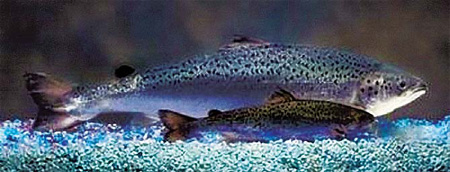Science and Health
US debates whether modified fish safe to eat
By Mary Clare Jalonick (China Daily)
Updated: 2010-09-23 10:11
 |
Large Medium Small |
 |
|
A genetically modified salmon is much bigger than a wild one, as shown in this undated file picture. [File photo] |
WASHINGTON - Consumer advocates, at a hearing on Tuesday, urged the US Food and Drug Administration (FDA) to label salmon engineered to grow twice as fast as wild salmon as genetically modified.
If the FDA approves the sale of the salmon, it will be the first time the government has allowed such modified animals to be marketed for human consumption.
| ||||
The agency has already said it believes the two fish are the same, but it is holding the hearing to listen to the arguments of critics and supporters before it makes a decision on whether to allow the fish to be sold or not.
Consumer advocates say it is the public's right to know. Dr Michael Hansen, senior scientist at Consumers Union, the publisher of Consumer Reports, testified that his organization disagrees with the FDA's decision that genetic engineering does not constitute a material difference in the two fish.
"You need this labeling so that if there's a problem down the road, you can trace it back," Hansen said.
He said that the agency has the authority to demand the labels, citing previous rules that allowed genetically modified foods to be labeled so people with religious or cultural sensitivities can avoid them.
Ron Stotish, CEO of AquaBounty, the company that has developed the fish and is applying to the FDA to market it, argued that genetically modified salmon have the same flavor, texture, color and odor as unmodified salmon.
"This fish is an Atlantic salmon," he said.
The Atlantic salmon engineered by AquaBounty has an added growth hormone from a Chinook salmon that allows the fish to produce growth hormones all year long. The engineers were able to keep the hormone active by using another gene from an eel-like fish called an ocean pout that acts like an on switch for the hormone.
In documents released ahead of the hearing, the FDA agreed with the company, saying there are no biologically relevant differences between the engineered salmon and unmodified salmon, and there is a reasonable certainty that no harm will come from its consumption.
On Monday, FDA scientists said at the hearing that there are very few differences between the modified salmon and conventional fish. But an advisory panel that heard the evidence was more cautious, saying more study is needed to be sure.
Speaking on Tuesday, Alison L. Van Eenennaam of the University of California, and Gregory Jaffe of the Center for Science in the Public Interest, agreed with the FDA and said there was no evidence from the data provided that the two were different enough to be labeled as such, though Jaffe urged the FDA to ensure the fish is somehow branded so consumers know what they are eating.
"The reality is there are consumers out there who want to know if their salmon has been genetically engineered," he said.
AquaBounty submitted its first application for FDA approval in 1995, but the agency only decided to consider applications for genetically engineered animals two years ago.
Genetically engineered animals are not clones, which are copies of animals, and which the FDA has already said are safe to eat. Genetically engineered animals have altered DNA.
Critics have two main concerns about the modified fish: The safety of the food to humans and the salmon's effect on the environment.
Because the altered fish has never been eaten before, they say, it could include dangerous allergens, especially as seafood is highly allergenic. They also worry that the fish might escape and intermingle with the wild salmon population, which is already endangered. The genetically modified fish would grow fast and consume more food to the detriment of conventional wild salmon.



